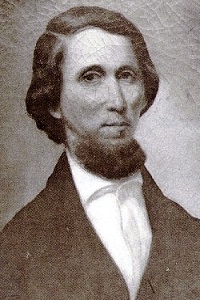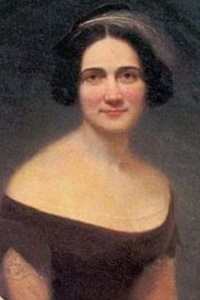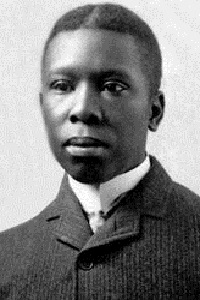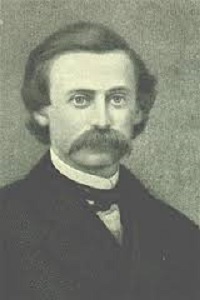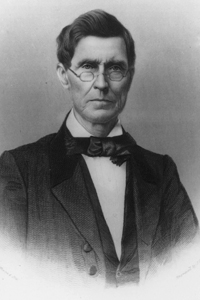The Audio Library of
Classic Southern Literature
1676 to 1923
Made possible by 
Visit our Children's literature site 
The Gander Pull
by Augustus Baldwin Longstreet
Written Text
“advurtysement.
“Thos woo wish To be inform heareof, is heareof notyfide that edwd. Prator will giv a gander pullin, jis this side of harisburg, on Satterday of thes pressents munth to All woo mout wish to partak tharof.
“e Prator, thos wishin to purtak will cum yearly, as the pullin will begin soon.
“e. p.”
If I am asked why “jis this side of harisburg” was elected for the promised feat instead of the city of Augusta, I answer from conjecture, but with some confidence, because the ground chosen was near the central point between four rival towns, the citizens of all which “mout wish to partak tharof;” namely, Augusta, Springfield, Harrisburg, and Campbellton.
[The following five paragraphs are not read aloud.]
Not that each was the rival of all the others, but that the first and the last were competitors, and each of the others backed the pretensions of its nearest neighbour. Harrisburg sided with Campbellton, not because she had any interest in seeing the business of the two states centre upon the bank of the river, nearly opposite to her; but because, like the “Union Democratic Republican Party of Georgia,” she thought, after the adoption of the Federal Constitution, that the several towns of the confederacy should no longing be “separated” by the distinction of local party; but that, laying down all former prejudices and jealousies as a sacrifice on the altar of their country, they should become united in a single body, for the maintenance of those principles which they deemed essential to the public welfare.
Springfield, on the other hand, espoused the State Rights’ creed. She admitted that, under the Federal Compact, she ought to love the sister states very much; but that, under the Social Compact, she ought to love her own state a little more; and she thought the two compacts perfectly reconcilable to each other. Instead of the towns of the several states getting into single bodies to preserve the public welfare, her doctrine was, that they should be kept in separate bodies to preserve the private welfare. She admitted frankly, that, living, as she always had lived, right amid gullies, vapors, fogs, creeks, and lagoons, she was wholly incapable of comprehending that expansive kind of benevolence, which taught her to love people whom she knew nothing about, as much as her next-door neighbors and friends. Until, therefore, she should learn it from the practical operation of the Federal Compact, she would stick to the old-fashioned Scotch love, which she understood perfectly, and “go in” for Augusta, live or die, hit or miss, right or wrong. As in the days of Mr. Jefferson, the Springfield doctrines prevailed, Campbellton was literally nullified; insomuch that, ten years ago, there was not a house left to mark the spot where once flourished this active, busy little village. Those who are curious to know where Springfield stood at the time of which I am speaking, have only to take their position at the intersection of Broad and Marbury streets, in the city of Augusta, and they will be in the very heart of old Springfield. Sixty steps west, and as many east of this position, will measure the whole length of this Jeffersonian republican village, which never boasted of more than four dwelling-houses; and Broad-street measures its width, if we exclude kitchens and stables. And, while upon this subject, since it has been predicted by a man for whose opinions I entertain the profoundest respect * (especially since the prediction), that my writings will be read with increased interest a hundred years to come; and as I can see no good reason, if this be true, why they should not be read a thousand years hence with more interest, I will take the liberty of dropping a word here to the curious reader of the year 1933. He will certainly wish to know the site of Harrisburg (seeing it is doomed, at no distant period, to share the fate of Springfield) and of Campbellton.
Supposing, then, that if the great fire in Augusta, on the 3d of April, 1829, did not destroy that city, nothing will; I select this as a permanent object.
In 1798, Campbell-street was the western verge of Augusta, a limit to which it had advanced but a few years before, from Jackson-street. Thence to Springfield led a large road, now built up on either side, and forming a continuation of Broad-street. This road was cut across obliquely by a deep gully, the bed of which was an almost impassable bog, which entered the road about one hundred yards below Collock-street on the south, and left it about thirty yards below Collock-street on the north side of now Broad-street. It was called Campbell’s Gully, from the name of the gentleman through whose possessions and near whose dwelling it wound its way to the river. Following the direction of Broad-street from Springfield westward, 1347 yards, will bring you to Harrisburg, which had nothing to boast of over Springfield but a warehouse for the storage of tobacco, then the staple of Georgia. Continue the same direction 700 yards, then face to your right hand, and follow your nose directly across Savannah River, and, upon ascending the opposite bank, you will be in the busiest part of Campbellton in 1798. Between Harrisburg and Springfield, and 1143 yards from the latter, there runs a stream which may be perpetual. At the time just mentioned, it flowed between banks twelve or fourteen feet high, and was then called, as it still is, “Hawk’s Gully.” [It took its name from an old man by the name of Hawk, who lived in a log hut on a small knoll on the eastern side of the gully and about 100 yards south of the Harrisburg road. The Editor of the “Hickory Nut.”]
Now Mr. Prator, like the most successful politician of the present day, was on all sides in a doubtful contest; and, accordingly, he laid off his gander-pulling ground on the nearest suitable unappropriated spot to the centre point between Springfield and Harrisburg. This was between Harrisburg and Hawk’s Gully, to the south of the road, and embraced part of the road, but within 100 yards of Harrisburg.
[Audio begins again at this point.]
When “Satterday of thes pressents munth” rolled round, I determined to go to the gander-pulling. When I reached the spot, a considerable number of persons, of different ages, sexes, sizes, and complexions, had collected from the rival towns and the country around. But few females were there, however; and those few were from the lowest walks of life.
A circular path of about forty yards diameter had already been laid out; over which, from two posts about ten feet apart, stretched a rope, the middle of which was directly over the path. The rope hung loosely, so as to allow it, with the weight of a gander attached to it, to vibrate in an arc of four or five feet span, and so as to bring the breast of the gander within barely easy reach of a man of middle stature upon a horse of common size.
A hat was now handed to such as wished to enter the list; and they threw into it twenty-five cents each; this sum was the victor’s prize.
The devoted gander was now produced; and Mr. Prator, having first tied his feet together with a strong cord, proceeded to the neck-greasing. Abhorrent as it may be to all who respect the tenderer relations of life, Mrs. Prator had actually prepared a gourd of goose-grease for this very purpose. For myself, when I saw Ned dip his hands into the grease, and commence stroking down the feathers from breast to head, my thoughts took a melancholy turn. They dwelt in sadness upon the many conjugal felicities which had probably been shared between the greasess and the greasee. I could see him as he stood by her side, through many a chilly day and cheerless night, when she was warming into life the offspring of their mutual loves, and repelled, with chivalrous spirit, every invasion of the consecrated spot which she had selected for her incubation. I could see him moving with patriarchal dignity by the side of his loved one, at the head of a smiling, prattling group, the rich reward of their mutual care, to the luxuries of the meadow or to the recreations of the pool. And now, alas! an extract from the smoking sacrifice of his bosom friend was desecrated to the unholy purpose of making his neck “a fit object” for Cruelty to reach “her quick, unerring fingers at.” Ye friends of the sacred tie! judge what were my feelings when, in the midst of these reflections, the voice of James Prator thundered on mine ear, “Darn his old dodging soul; brother Ned! grease his neck till a fly can’t light on it!”
Ned, having fulfilled his brother Jim’s request as well as he could, attached the victim of his cruelty to the rope directly over the path. On each side of the gander was stationed a man, whose office it was to lash forward any horse which might linger there for a moment; for, by the rules of the ring, all pulling was to be done at a brisk canter.
The word was now given for the competitors to mount and take their places on the ring. Eight appeared: Tall Zubley Zin, mounted upon Sally Spitfire; Arch Odum, mounted on Bull and Ingons (onions); Nathan Perdew, on Hellcat; James Dickson, on Nigger; David Williams, on Gridiron; Fat John Fulger, on Slouch; Gorham Bostwick, on Gimlet; and Turner Hammond, on ‘Possum.
“Come, gentlemen,” said Commandant Prator, “fall in. All of you git behind one another, sort o’ in a row.”
All came into the track very kindly but Sally Spitfire and Gridiron. The former, as soon as she saw a general movement of horses, took it for granted there was mischief brewing, and, because she could not tell where it lay, she concluded it lay everywhere, and therefore took fright at everything.
Gridiron was a grave horse; but a suspicious eye which he cast to the right and left, wherever he moved, showed that “he was wide awake,” and that “nobody better not go footing with him,” as his owner sometimes used to say. He took a sober but rather intense view of things; insomuch that, in his contemplations, he passed over the track three times before he could be prevailed upon to stop in it. He stopped at last, however; and when he was made to understand that this was all that was required of him for the present, he surrendered his suspicions at once, with a countenance which seemed plainly to say, “Oh, if this is all you want, I’ve no objection to it.”
It was long before Miss Spitfire could be prevailed upon to do the like.
“Get another horse, Zube,” said one; “Sal will never do for a gander pullin.”
“I won’t,” said Zube. “If she won’t do, I’ll make her do. I want a nag that goes off with a spring; so that, when I get a hold, she’ll cut the neck in two like a steel-trap.”
At length Sally was rather flung than coaxed into the track, directly ahead of Gridiron.
“Now, gentlemen,” said the master of the ceremonies, “no man’s to make a grab till all’s been once round; and when the first man are got round, then the whole twist and tucking of you grab away as you come under (“Look here, Jim Fulger! you better not stand too close to that gander, I tell you”), one after another. Now blaze away!” (the command for an onset of every kind with people of this order).
Off they went, Miss Sally delighted; for she now thought the whole parade would end in nothing more nor less than her favourite amusement, a race. But Gridiron’s visage pronounced this the most nonsensical business that ever a horse of sense was engaged in since the world began.
For the first three rounds Zubly was wholly occupied in restraining Sally to her place; but he lost nothing by this, for the gander had escaped unhurt. On completing his third round, Zube reached forth his long arm, grabbed the gander by the neck with a firmness which seemed likely to defy goose-grease, and, at the same instant, he involuntarily gave Sally a sudden check. She raised her head, which before had been kept nearly touching her leader’s hocks, and for the first time saw the gander in the act of descending upon her; at the same moment she received two pealing lashes from the whippers. The way she now broke for Springfield “is nothing to nobody.” As Zube dashed down the road, the whole Circus raised a whoop after him. This started about twenty dogs, hounds, curs, and pointers, in full chase of him (for no one moved without his dog in those days). The dogs alarmed some belled cattle, which were grazing on Zube’s path, just as he reached them; these joined him, with tails up and a tremendous rattling. Just beyond these went three tobacco-rollers, at distances of fifty and a hundred yards apart; each of whom gave Zube a terrified whoop, scream, or yell as he passed.
He went in and out of Hawk’s Gully like a trapball, and was in Springfield “in less than no time.” Here he was encouraged onward by a new recruit of dogs; but they gave up the chase as hopeless before they cleared the village. Just beyond Springfield, what should Sally encounter but a flock of geese! the tribe to which she owed all her misfortunes. She stopped suddenly, and Zube went over her head with the last acquired velocity. He was up in a moment, and the activity with which he pursued Sally satisfied every spectator that he was unhurt.
Gridiron, who had witnessed Miss Sally’s treatment with astonishment and indignation, resolved not to pass between the posts until the whole matter should be explained to his satisfaction. He therefore stopped short, and, by very intelligible looks, demanded of the whippers whether, if he passed between them, he was to be treated as Miss Spitfire had been? The whippers gave him no satisfaction, and his rider signified, by reiterated thumps of the heel, that he should go through whether he would or not. Of these, however, Gridiron seemed to know nothing. In the midst of the conference, Gridiron’s eye lit upon the oscillating gander, and every moment’s survey of it begat in him a growing interest, as his slowly rising head, suppressed breath, and projected ears plainly evinced. After a short examination, he heaved a sigh, and looked behind him to see if the way was clear. It was plain that his mind was now made up; but, to satisfy the world that he would do nothing rashly, he took another view, and then wheeled and went for Harrisbug as if he had set in for a year’s running. Nobody whooped at Gridiron, for all saw that his running was purely the result of philosophic deduction. The reader will not suppose all this consumed half the time which has been consumed in telling it, though it might have been so without interrupting the amusement; for Miss Spitfire’s flight had completely suspended it for a time.
The remaining competitors now went on with the sport. A few rounds showed plainly that Odum or Bostwick would be the victor; but which, no one could tell. Whenever either of them came round, the gander’s neck was sure of a severe wrench. Many a half pint of Jamaica was staked upon them, besides other things. The poor gander withstood many a strong pull before his wailings ceased. At length, however, they were hushed by Odum. Then came Bostwick, and broke the neck. The next grasp of Odum, it was thought, would bear away the head; but it did not. Then Bostwick was sure of it; but he missed it. Now Odum must surely have it. All is interest and animation; the horses sweep round with redoubled speed; every eye is upon Odum; his backers smiling, Bostwick’s trembling. To the rope he comes; lifts his hand; when, lo! Fat John Fulger had borne it away the second before. All were astonished, all disappointed, and some were vexed a little; for it was now clear that, “if it hadn’t o’ been for his great, fat, greasy paw,” to use their own language,”Odum would have gained the victory.” Others cursed “that long-legged Zube Zin, who was so high he didn’t know when his feet were cold, for bringing such a nag as Sal Spitfire to a gander pullen; for if he’d o’ been in his place, it would o’ flung Bostwick right where that gourd o’ hog’s lard (Fulger) was.”
Fulger’s conduct was little calculated to reconcile them to their disappointment.
“Come here, Neddy Prater,” said he, with a triumphant smile; “let your Uncle Johnny put his potato stealer (hand) into that hat, and tickle the chins of them are shiners a little! Oh you little shining sons o’ bitches! walk into your Mas’ Johnny’s pocket, and jingle so as Arch Odum and Gory Bostwick may hear you! You hear ‘em, Gory? Boys, don’t pull with men any more. I’ve jist got my hand in; I wish I had a pond full o’ ganders here now, jist to show how I could make their heads fly. Bet all I’ve won, you may hang three upon that rope, and I’ll set Slouch at full speed, and take off the heads of all three the first grab; two with my hands and one with my teeth.”
Thus he went on, but really there was no boasting in all this; it was all fun; for John knew, and all were convinced that he knew, that his success was entirely the result of accident. John was really “a good-natured fellow,” and his cavorting had an effect directly opposite to that which the reader would suppose it had; it reconciled all to their disappointment save one. I except little Billy Mixen, of Spirit Creek; who had staked the net proceeds of six quarts of huckleberries [I give them their Georgia name. I should hardly be understood if I called them whortleberries. ] upon Odum, which he had been long keeping for a safe bet. He could not be reconciled until he fretted himself into a pretty little piney -woods fight, in which he got whipped; and then he went home perfectly satisfied.
Fulger spent all his winnings with Prator in treats to the company; made most of them drunk, and thereby produced four Georgia rotations; [I borrowed this term from Jim Inman at the time. “Why, Jim,” said I to him, just as he rose from a fight, “what have you been doing?” “Oh,” said he, “nothing but taking a little rotation with Bob M’Manus.”] after which all parted good friends.
………………………
“The Gander Pulling”
By Augustus Baldwin Longstreet
Read by Bob Rollins
Directed by Walter Evans
Copyright Georgia Regents University
2011 All Rights Reserved
